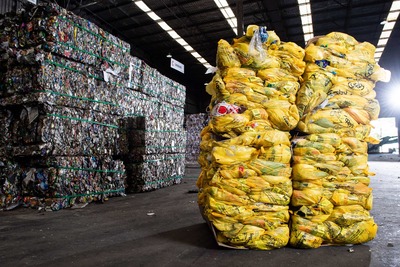KitKat breaking apart Australia's waste challenge

A group of companies have collaborated to create a KitKat wrapper made partially with recycled soft plastic content, in what is claimed as an Australian first.
Nestlé, CurbCycle, iQ Renew, Licella, Viva Energy Australia, LyondellBasell, REDcycle, Taghleef Industries and Amcor brought their individual expertise together to collect and process waste soft plastic, turn it back into oil and create the prototype wrapper.
Food-grade recycled soft plastic is often considered the key towards improving waste management and building a circular economy. However, a lack of both collection and processing infrastructure has made it difficult to keep waste out of landfill and to meet demands for packaging with recycled content.
The companies said turning soft plastic back into oil is the only path soft plastic waste can take if it is to be transformed into a food-safe wrapper: technology that Australia does not yet have at scale.
The initiative emerged from a trial underway on the NSW Central Coast, where Australian recycler iQ Renew and Nestlé are working together on a trial of kerbside collection of soft plastics. These collected plastics, together with plastics collected via the REDcycle supermarket soft plastic collection, formed the starting point for the project.
Sandra Martinez, CEO of Nestlé Australia, said the project had been driven by a shared determination to resolve the soft plastics challenge — and an enormous amount of goodwill.
“Between us, we have shown that there’s a pathway to solve the soft plastics problem. To build this at scale, across all states and territories, across hundreds of councils, is going to take a huge effort from government at all levels, from industry and from consumers,” Martinez said.
“Manufacturers like Nestlé will have a key role in driving demand for food-grade recycled soft plastic packaging, and creating market conditions that will ensure all stakeholders throughout the value chain view soft plastics as a resource and not waste.”
Currently, soft plastics collected in Australia have been made into products like outdoor furniture, added to road base or used in waste-to-energy.
Danial Gallagher, CEO of iQ Renew, said that to improve the recycling rate of soft plastics, kerbside collection is an important point of convenience.
“In the trial, soft plastics are collected from kerbside recycling bins in a dedicated bright yellow bag, then sorted from the recycling stream at our MRF,” he said.

“To create the KitKat wrapper with 30% recycled content, the soft plastics were processed, then sent to Licella for conversion back into the oil from which they originally came. This oil was then used to produce new food-grade soft plastics.”
Environmental Minister Sussan Ley said the work of the industry coalition was indicative of the level of collaboration required if Australia is to embrace a fully functioning circular economy.
“The Morrison government is driving a $1 billion transformation of the waste and recycling industry, steering it toward the circular economy. Helping kick-start the circular economy is the best way to get bang for the taxpayer buck, realising both environmental and economic benefits,” Ley said.
Tanya Barden, CEO of the Australian Food and Grocery Council (AFGC), said learnings from the Central Coast trial will be informative as the AFGC works to develop an extended producer responsibility scheme for hard-to-recycle plastics, funded by a National Product Stewardship Investment Fund grant.
“Among other things, we’ll be looking at how this model can be scaled up, ensuring there is healthy demand for packaging with recycled content and helping bring to life local industries that can unlock billions of dollars of value that’s currently lost to landfill,” she said.
On 19 March, Nestlé will host leaders from across the plastic packaging value chain for a roundtable event, The Wrap on Soft Plastics, exploring the opportunities and hurdles for soft plastics recycling.
“At the event, we will share the lessons learned so far from the Central Coast trial and begin to unpack the next steps on the road to reducing soft plastic waste,” Martinez said.
Vacuum pumps for fish packaging
A vacuum solution from Atlas Copco is used for the energy-efficient production of EPS boxes used...
Optimised system for bottle washing machine
A water bottle facility in Germany implemented a system for bottle washing which is reducing...
Sustainabili-tea: compostable teabags in hotel sector
In the UK, packaging specialist Parkside has partnered with tea brand Hoogly to develop a range...












